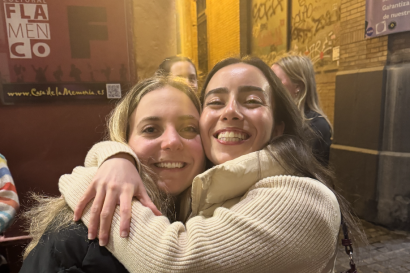Everyone’s favorite part of studying abroad: The passport and visa application process. Just kidding :) But in all seriousness, I have a few tips to share based on my own trials and tribulations.
Let’s start with the passport. Every student studying abroad needs an up-to-date passport. This means you need to have a passport that is valid for at least six months after your program's end date. Unfortunately, my program ends in May, and my passport was set to expire in October—five months after my program’s end date. Not ideal, but I applied to renew my passport and checked that off my bucket list early. For spring study abroad students, I would recommend following a schedule similar to this: I applied for my passport renewal at the end of May 2024, booked my visa appointment for mid-October 2024, and am leaving for Granada at the end of January 2025. I recommend starting this early because 1) I am an over-planner, and 2) the passport renewal process can take some time. You’ll need to gather the necessary documents and send them to the State Department, and trust me, you don’t want to deal with this while juggling your fall semester. As a student-athlete, I know how busy schedules get; this is one thing you don’t want to add to your plate last minute. Summer is a much more relaxed time so securing your updated passport early will make your life a whole lot easier.
Now, let’s talk about the visa. For most students, I recommend applying for your visa through the IES Abroad group visa program, ACCeSS. It’s a simple, streamlined option, and it’s the route I wish I’d been able to take. Unfortunately because of an extenuating circumstance, I could not use the program. However, the IES staff was extremely helpful in providing me with a checklist for all the documents I needed to apply. Shoutout to my IES Abroad academic advisor, Kayti, who has been so kind and helpful throughout this process!
Here’s the thing: applying for a visa requires more documents and additional components than you might think. This is why I suggest starting early. Even though my appointment wasn’t until late October, I started gathering everything in early September. This was partly because I am a student-athlete and also an out-of-state student, but also because breaking it down into smaller tasks each week helps prevent last-minute stress. For example, I went to CVS with my friend one week to take my visa photos. Another week, I went to FedEx and got my student ID notarized. Little by little, these tasks added up and I avoided the panic that comes from waiting to do everything the week before your visa application is due.
Lastly, if you’re submitting your visa application in person, here are two important pieces of advice. First, book your visa appointment as early as possible. These appointments fill up fast, so I recommend booking at least three to four weeks in advance if you want to find a convenient time. "Second, if you're making the long journey to the BLS International visa center (a third-party company that handles visa processing for certain countries), which is probably farther than you'd like—YOU SHOULD BRING A ROAD TRIP FRIEND." I drove solo on a three-hour trip to Houston because my friends had midterms, but I called so many family and friends along the way to keep me company. So, you will survive the trip either way, and I may be being a little dramatic, but a road trip with your best friend makes the process much more fun!
In conclusion, my advice is simple: start everything early. The passport and visa application processes can be time-consuming and tedious, but anything worthwhile requires effort. And don’t be afraid to make mistakes—this process is new for most people, so mistakes are bound to happen. Give yourself plenty of time to figure things out, and you'll be just fine!


